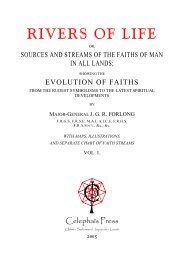Dutch Fairy Tales by William Elliot Griffis.pdf
Dutch Fairy Tales by William Elliot Griffis.pdf
Dutch Fairy Tales by William Elliot Griffis.pdf
You also want an ePaper? Increase the reach of your titles
YUMPU automatically turns print PDFs into web optimized ePapers that Google loves.
the fun.<br />
<strong>Dutch</strong> <strong>Fairy</strong> <strong>Tales</strong> for Young Folks<br />
But where was the giant? None of the captains could find him. Not one of the prisoners or the garrison could<br />
tell where he had hid.<br />
But Brabo knew that the big fellow, Antigonus, was not at all brave, but really only a bully and a coward. So<br />
the lad was not afraid. Some of his comrades outside helped him to set up a tall ladder against the wall. Then,<br />
while all the watchers and men−at−arms inside, had gone away to defend the gates, Brabo climbed into the<br />
castle, through a slit in the thick wall. This had been cut out, like a window, for the bow−and−arrow men, and<br />
was usually occupied <strong>by</strong> a sentinel. Sword in hand, Brabo made for the giant's own room. Glaring at the<br />
youth, the big fellow seized his club and brought it down with such force that it went through the wooden<br />
floor. But Brabo dodged the blow and, in a trice, made a sweep with his sword. Cutting off the giant's head, he<br />
threw it out the window. It had hardly touched the ground, before the dogs arrived. One of the largest of these<br />
ran away with the trophy and the big, hairy noddle of the bully was never found again.<br />
But the giant's huge hands! Ah, they were cut off <strong>by</strong> Brabo, who stood on the very top of the highest tower,<br />
while all below looked up and cheered. Brabo laid one big hand on top of the other, as the giant used to do,<br />
when he cut off the hands of captains. He took first the right hand and then the left hand and threw them, one<br />
at a time, into the river.<br />
A pretty sight now revealed the fact that the people knew what had been going on and were proud of Brabo's<br />
valor. In a moment, every house in Antwerp showed lighted candles, and the city was illuminated. Issuing<br />
from the gates came a company of maidens. They were dressed in white, but their leader was robed in yellow,<br />
red, and black, the colors of the Brabant flag. They all sang in chorus the praises of Brabo their hero.<br />
“Let us now drop the term of disgrace to the city—that of the Hand−Throwing and give it a new name,” said<br />
one of the leading men of Antwerp.<br />
“No,” said the chief ruler, “let us rather keep the name, and, more than ever, invite all peaceful ships to come<br />
again, 'an−'t−werf' (at the wharf), as of old. Then, let the arms of Antwerp be two red hands above a castle.”<br />
“Agreed,” cried the citizens with a great shout. The Duke of Brabant approved and gave new privileges to the<br />
city, on account of Brabo's bravery. So, from high to low, all rejoiced to honor their hero, who was richly<br />
rewarded.<br />
After this, thousands of ships, from many countries, loaded or unloaded their cargoes on the wharves, or<br />
sailed peacefully <strong>by</strong>. Antwerp excelled all seaports and became very rich again. Her people loved their native<br />
city so dearly, that they coined the proverb “All the world is a ring, and Antwerp is the pearl set in it.”<br />
To this day, in the great square, rises the splendid bronze monument of Brabo the Brave. The headless and<br />
handless hulk of the giant Antigonus lies sprawling, while on his body rests Antwerp castle. Standing over all,<br />
at the top, is Brabo high in air. He holds one of the hands of Antigonus, which he is about to toss into the<br />
Scheldt River.<br />
No people honor valor more than the Belgians. Themselves are to−day, as of old, among the bravest.<br />
THE FARM THAT RAN AWAY AND CAME BACK<br />
There was once a <strong>Dutch</strong>man, who lived in the province called Drenthe. Because there was a row of little trees<br />
on his farm, his name was Ryer Van Boompjes; that is, Ryer of the Little Trees. After a while, he moved to<br />
the shore of the Zuyder Zee and into Overijssel. Overijssel means over the Ijssel River. There he bought a new<br />
THE FARM THAT RAN AWAY AND CAME BACK 46






![[PDF] Prolegomena](https://img.yumpu.com/16774951/1/190x245/pdf-prolegomena.jpg?quality=85)









